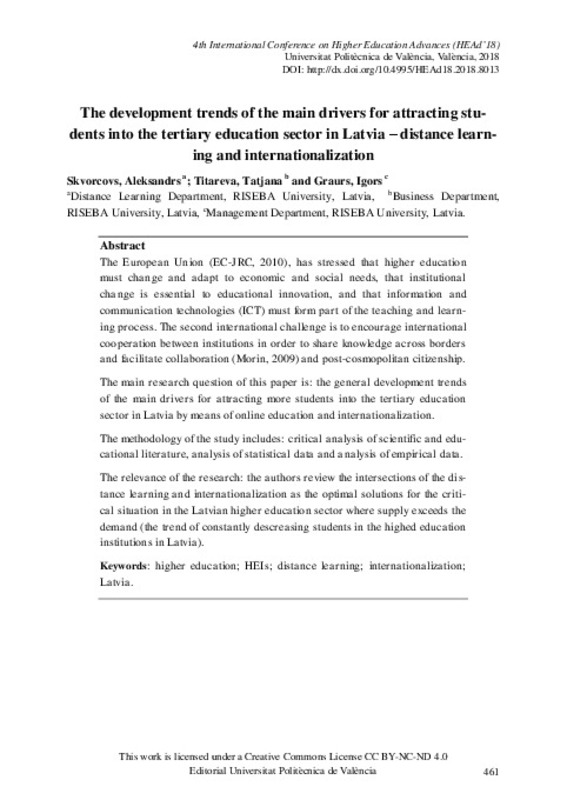JavaScript is disabled for your browser. Some features of this site may not work without it.
Buscar en RiuNet
Listar
Mi cuenta
Estadísticas
Ayuda RiuNet
Admin. UPV
The development trends of the main drivers for attracting students into the tertiary education sector in Latvia – distance learning and internationalization
Mostrar el registro sencillo del ítem
Ficheros en el ítem
| dc.contributor.author | Skvorcovs, Aleksandrs
|
es_ES |
| dc.contributor.author | Titareva, Tatjana
|
es_ES |
| dc.contributor.author | Igors, Graurs
|
es_ES |
| dc.date.accessioned | 2018-10-05T13:37:11Z | |
| dc.date.available | 2018-10-05T13:37:11Z | |
| dc.date.issued | 2018-07-02T13:37:11Z | |
| dc.identifier.isbn | 9788490486900 | es_ES |
| dc.identifier.issn | 2603-5871 | |
| dc.identifier.uri | http://hdl.handle.net/10251/109732 | |
| dc.description.abstract | [EN] The European Union (EC-JRC, 2010), has stressed that higher education must change and adapt to economic and social needs, that institutional change is essential to educational innovation, and that information and communication technologies (ICT) must form part of the teaching and learning process. The second international challenge is to encourage international cooperation between institutions in order to share knowledge across borders and facilitate collaboration (Morin, 2009) and post-cosmopolitan citizenship (Dobson and Bell, 2006). The dramatic decrease of the number of students in Latvia in the last 10 years by 64% and disproportionally high number of HE institutions, makes Latvia’s Government, the Ministry of Education and Science and higher education institutions to look for new ways to structure and optimize the processes in the higher education sector. The main research question of this paper is: the general development trends of the main drivers for attracting more students into the tertiary education sector in Latvia by means of online education and internationalization. The relevance of the research: the authors review the intersections of the distance learning and internationalization as the optimal solutions for the critical situation in the Latvian higher education sector with lack of students. | es_ES |
| dc.description.uri | http://ocs.editorial.upv.es/index.php/HEAD/HEAD18 | es_ES |
| dc.format.extent | 9 | |
| dc.language | Inglés | es_ES |
| dc.publisher | Editorial Universitat Politècnica de València | es_ES |
| dc.relation.ispartof | 4th International Conference on Higher Education Advances (HEAD'18) | |
| dc.rights | Reconocimiento - No comercial - Sin obra derivada (by-nc-nd) | es_ES |
| dc.subject | Higher Education | es_ES |
| dc.subject | Learning | es_ES |
| dc.subject | Educational systems | es_ES |
| dc.subject | Teaching | es_ES |
| dc.subject | HEIs | |
| dc.subject | Distance learning | |
| dc.subject | Internationalization | |
| dc.subject | Latvia | |
| dc.title | The development trends of the main drivers for attracting students into the tertiary education sector in Latvia – distance learning and internationalization | es_ES |
| dc.type | Comunicación en congreso | es_ES |
| dc.type | Capítulo de libro | es_ES |
| dc.identifier.doi | 10.4995/HEAD18.2018.8013 | es_ES |
| dc.rights.accessRights | Abierto | es_ES |
| dc.description.bibliographicCitation | Skvorcovs, A.; Titareva, T.; Igors, G. (2018). The development trends of the main drivers for attracting students into the tertiary education sector in Latvia – distance learning and internationalization. Editorial Universitat Politècnica de València. 461-469. https://doi.org/10.4995/HEAD18.2018.8013 | es_ES |
| dc.description.accrualMethod | OCS | es_ES |
| dc.relation.conferencename | Fourth International Conference on Higher Education Advances | es_ES |
| dc.relation.conferencedate | Junio 20-22,2018 | es_ES |
| dc.relation.conferenceplace | Valencia, Spain | es_ES |
| dc.relation.publisherversion | http://ocs.editorial.upv.es/index.php/HEAD/HEAD18/paper/view/8013 | es_ES |
| dc.description.upvformatpinicio | 461 | |
| dc.description.upvformatpfin | 469 | |
| dc.type.version | info:eu-repo/semantics/publishedVersion | es_ES |
| dc.relation.pasarela | OCS\8013 | es_ES |








